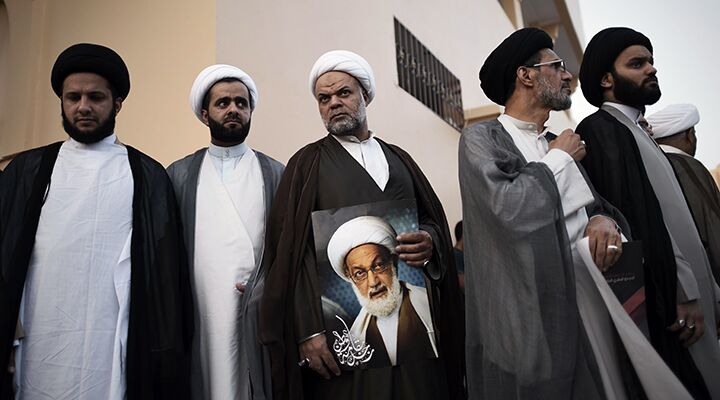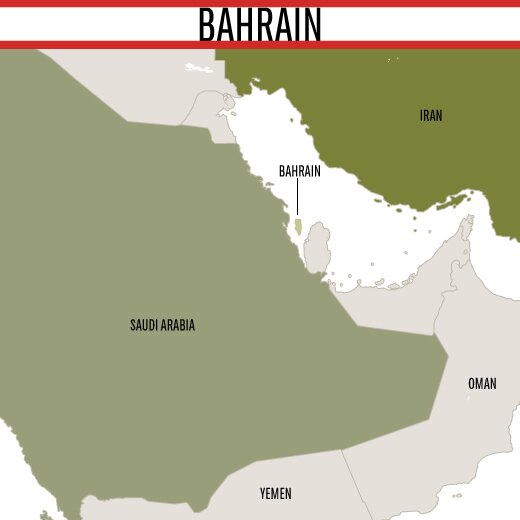
Bahrain Faces Renewed Uprising
Bahrain’s rulers have revoked the citizenship of Sheikh Isa Qassim, a prominent Shiite religious and political figure. The move has sparked outrage from Shiites both at home and abroad.
A Bahraini Interior Ministry statement accused Qassim of using his position to “serve foreign interests” and encourage “sectarianism and violence.” But the government decision to terminate his citizenship may yet incite its own sectarianism and violence.
The revoke comes just days after the government shut down the country’s chief opposition party. Al-Wefaq boasted the largest number of seats in the parliament—18 of a possible 40—as well as the best turnout at the polls. Yet it has now been suspended and all funds have been frozen.
Irrespective of numbers or popularity, shutting down the party shows that overall control still lies in the hands of Bahrain’s royal family.
While the broad majority of Bahrain’s population is Shiite, King Hamad bin Isa al-Khalifa and his ruling family is Sunni. Though the king has made futile gestures to reconcile with the dissatisfied Shiite population, his heavy-handed crackdowns have ensured a destabilized political climate.
Revoking Sheikh Qassim’s citizenship and shutting down al-Wefaq came after the party’s political leader, Sheikh Ali Salman, received an extension to his prison sentence.
Another move that has angered the Shiites is the exile of Zainab al-Khawaja. A human rights activist, she was a prominent figure in the 2011 uprising. Fearing rearrest after being released from prison in May, Khawaja fled to Denmark. Her father is currently serving a life sentence for his role in the 2011 uprising.
The government is targeting more activists by denying them the means to visit the Human Rights Council in Geneva, Switzerland. Many activists are trying to flee the nation in the face of government crackdowns.
Some 250 activists have now, like Qassim, been stripped of their citizenship—many more have been imprisoned.
Khalifa’s actions have angered the United Nations, whose basic rulings allow all people the right to citizenship in a given country. The United States is also upset, releasing a statement claiming that there is no proof to back allegations leveled against Qassim.
But the strongest response by far has come from Iran.
In statements carried by Iran’s semiofficial Fars News Agency, Iranian Gen. Qassem Suleimani lashed out at the Bahraini government. He called the revocation a “red line” and said that “passing this red line will create flames of fire in Bahrain and the entire region.”
Suleimani also threatened a “bloody intifada” and promised that “the toppling of the regime will only be a small part of the repercussions that will also include armed resistance.”
Note the thinly veiled threats to Saudi Arabia. In both statements, Suleimani not only points the finger at the Bahraini royalty, but also at broader targets.
It doesn’t take much to read between the lines and see Saudi Arabia in the crosshairs. Saudi Arabia invests heavily in the Bahraini government and has repeatedly assisted in quelling uprisings. Of all parties involved, the Saudis work the hardest to prop up the monarchy.
During the throes of the 2011 Arab Spring, Saudi Arabia supplied tanks and troops to Bahrain in order to silence the Shiite protesters. The riots were largely seen as a proxy struggle between the regional powers of Iran and Saudi Arabia. At least 30 protesters and five policemen were killed during the rioting. Since then, Bahraini society has been smoldering. Now, General Suleimani is talking about rekindling the flames and fanning them toward Saudi Arabia.

When the threat comes from the head of all Iranian-backed forces in Syria and Iraq and commander of the Quds Force, a subdivision of the Islamic Revolutionary Guard Corps, the threat is real.
Saudi Concerns
The last thing Saudi Arabia needs is a revolution on its doorstep, particularly one that is being fueled by Iran. An Iranian proxy just a stone’s throw from Riyadh’s prized oil fields would be a major security concern. Though only constituting 10 to 15 percent of the Saudi population, most of the country’s Shiites live close to Bahrain—increasing the risk of spillover violence from recent crackdowns.
Riyadh is already busy trying to curtail Iran’s inroads into Yemen. Should the Iranian-backed Houthi rebels gain the upper hand against the Saudi-backed government, Riyadh will need to start locking up its porous southern border. If Bahrain is added to the mix, the Saudis could quickly find themselves caught in a Shiite pincer.
Thus we see both Tehran and Riyadh scrambling to outmaneuver one another.
For the Saudis, this means major investment in Bahrain. Between 2003 and 2015, Riyadh invested more than $1.1 billion in the country. For Iran, it means backing the Shiites. According to Suleimani, that help is going to start taking an increasingly militant tact.
Western Concern
The Saudis are not the only ones who should worry. The United Kingdom signed a deal with the Sunni royal family where Bahrain would fund the upgrade of a British naval facility on the coast. Britain stations four mine-hunter vessels at the base—strategically vital tools in the busy trade lanes of the Persian Gulf.
The U.S. also risks having to make significant changes should the Bahraini government be overthrown.
Bahrain houses the U.S. 5th Fleet, the police force of the Persian Gulf. The current agreements were made with the ruling Sunnis. With so much to lose in the event of a revolution, the U.S. is placed in a tricky situation. It must choose to ignore or downplay the human rights violations committed by the government, or it must stand in support of the Shiites—risking further instability.
Should Suleimani be true to his word, there will soon be bloodshed in Bahrain. Such a conflict will quickly draw in the heavy weights, Saudi Arabia and Iran. And beyond that, the conflict could dislodge the U.S. 5th Fleet, further weakening America’s influence in the Middle East.
Bahrain’s government survived the storms of the Arab Spring, but it did not go unscathed. Now the monarchy risks fueling the fires and opening the door for Iranian intervention into this strategically vital island nation.
